选修8Unit5 Meeting your ancestors Reading and using language(两篇课文分析共50张PPT)
文档属性
| 名称 | 选修8Unit5 Meeting your ancestors Reading and using language(两篇课文分析共50张PPT) | 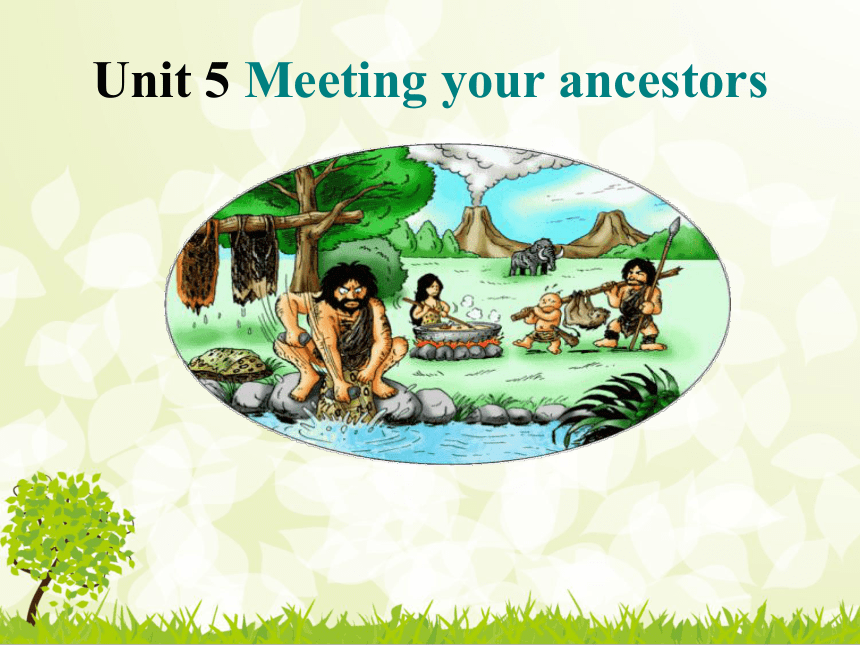 | |
| 格式 | zip | ||
| 文件大小 | 1.6MB | ||
| 资源类型 | 试卷 | ||
| 版本资源 | 人教版(新课程标准) | ||
| 科目 | 英语 | ||
| 更新时间 | 2020-05-25 15:47:16 | ||
图片预览

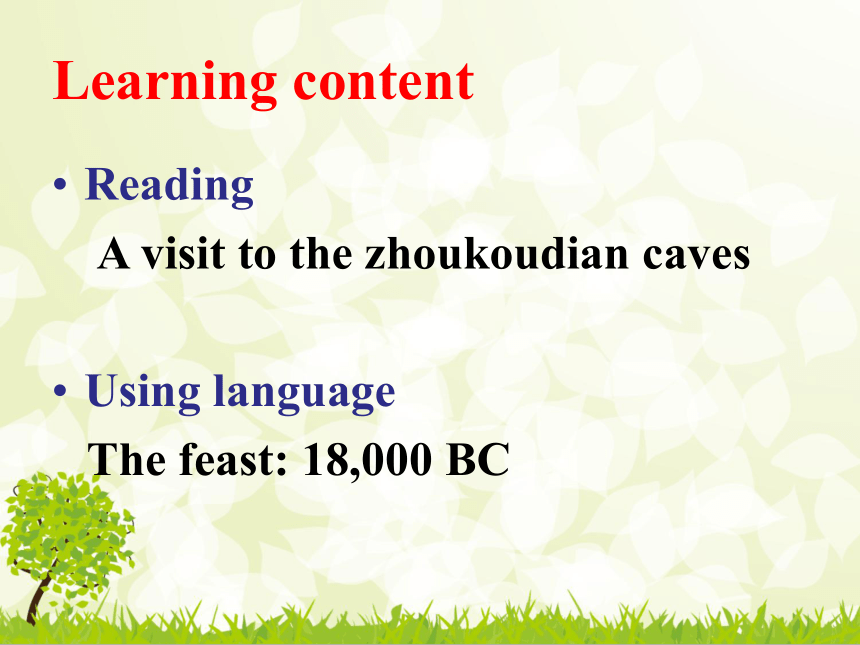
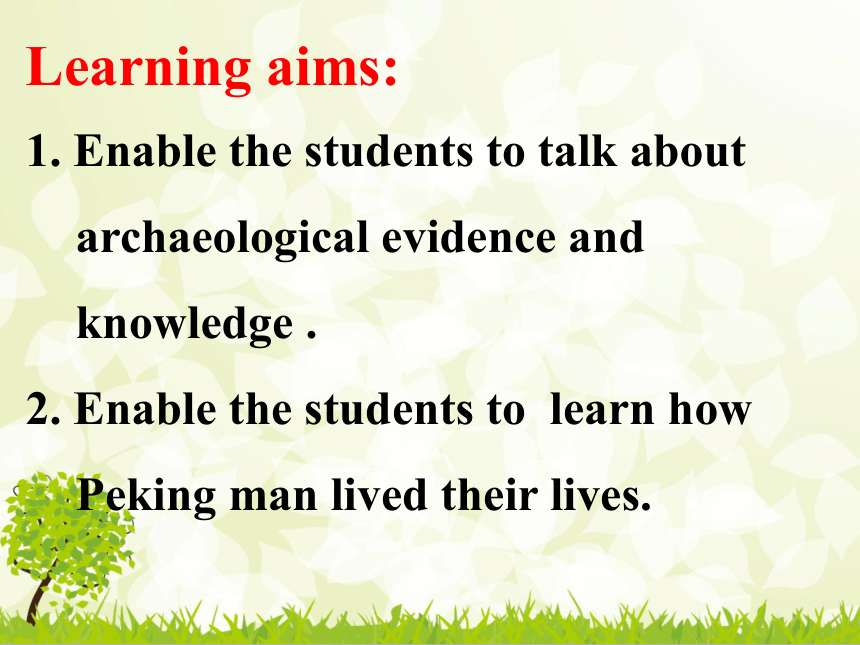
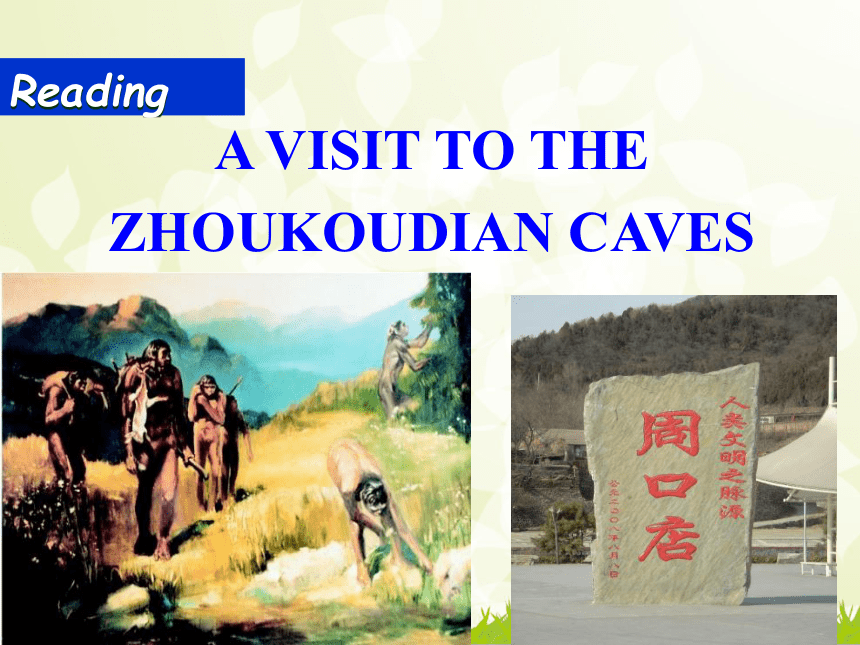
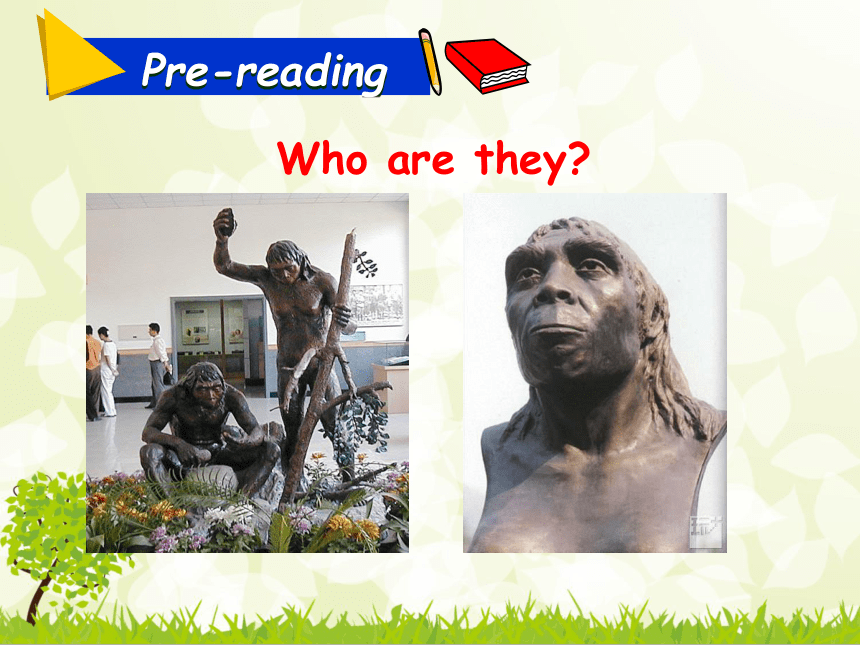
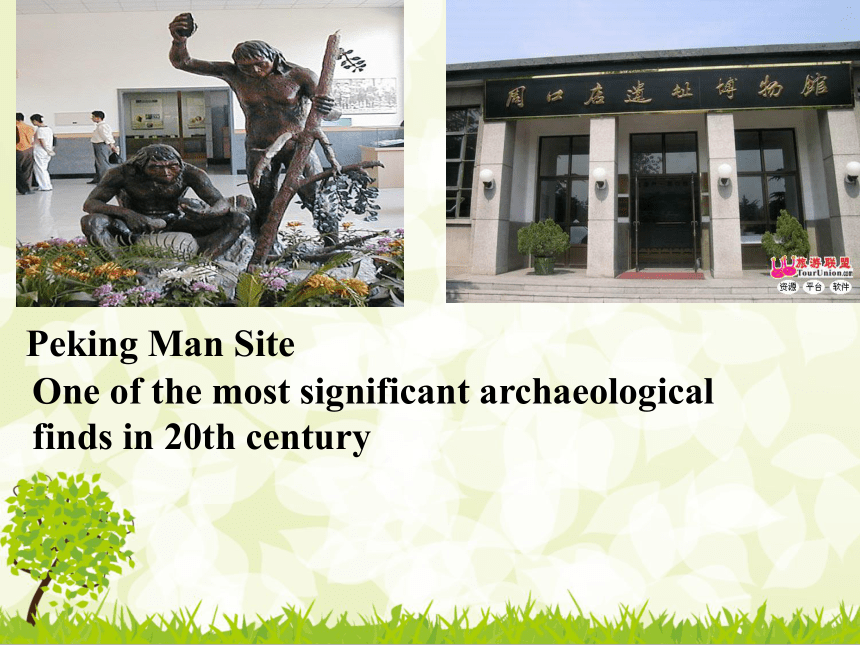

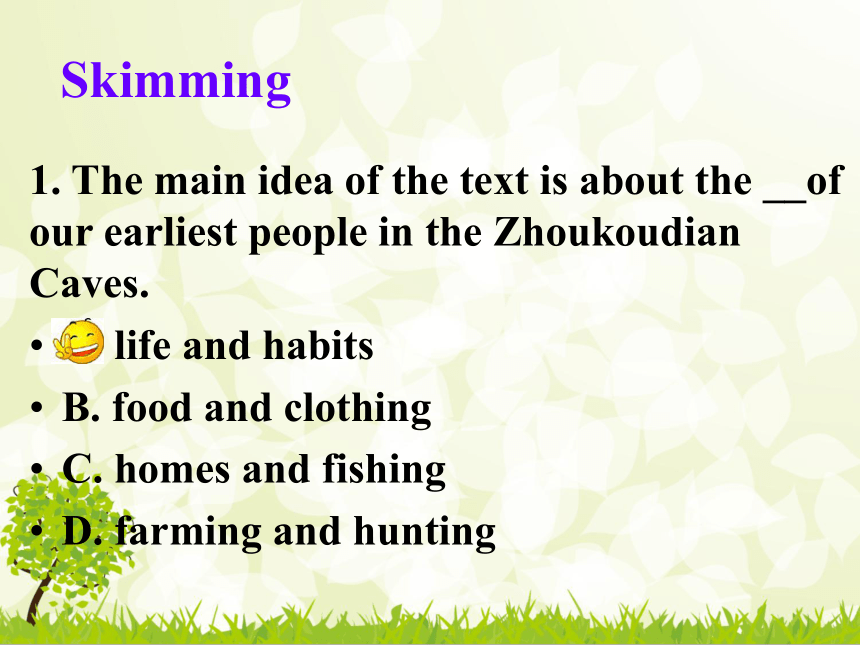
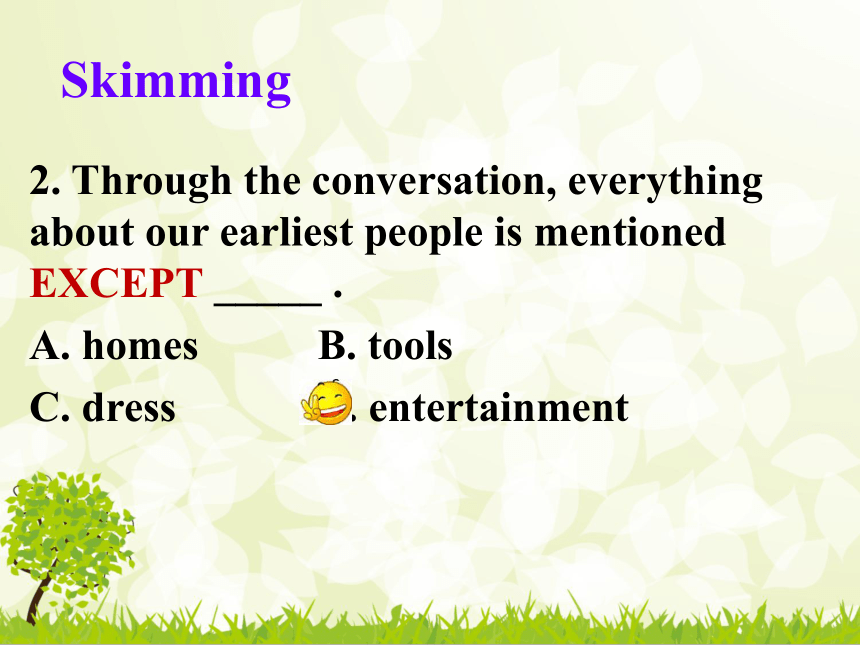
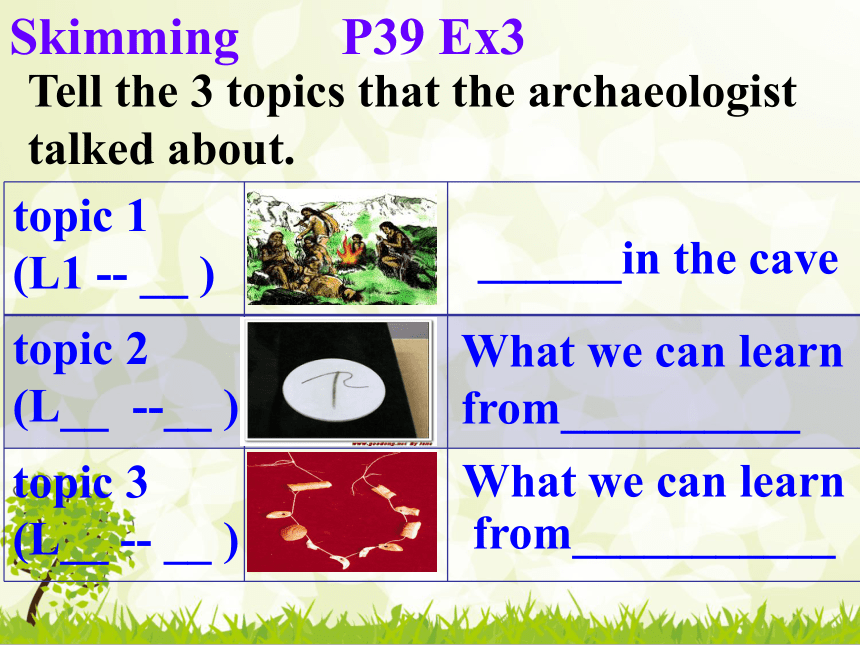
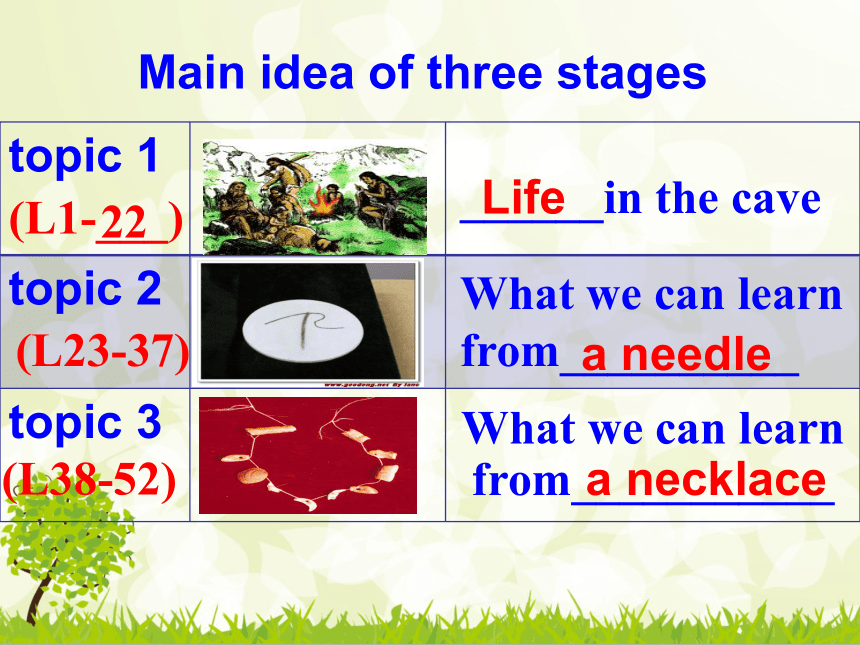
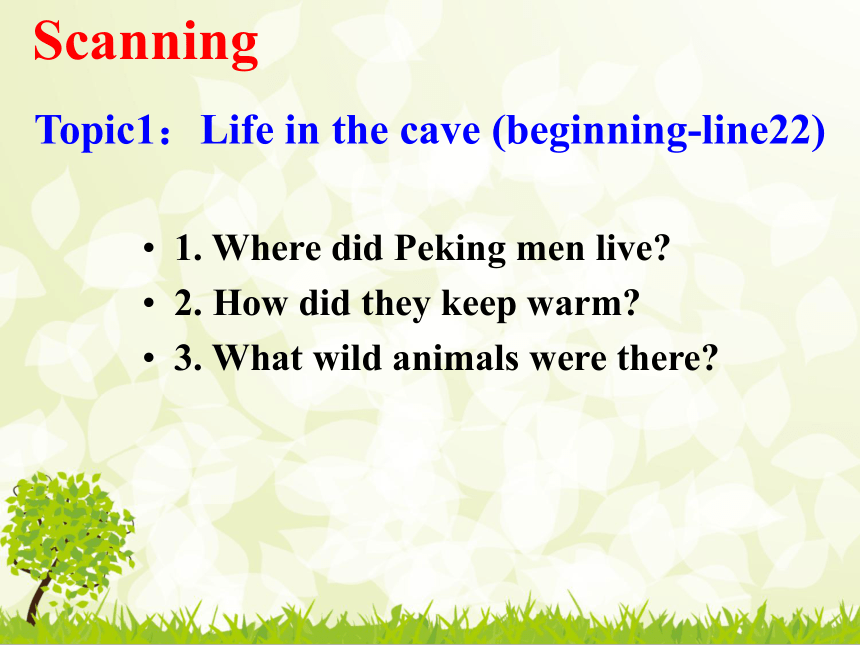
文档简介
(共50张PPT)
Unit 5 Meeting your ancestors
Learning content
Reading
A visit to the zhoukoudian caves
Using language
The feast: 18,000 BC
Learning aims:
1. Enable the students to talk about archaeological evidence and knowledge .
2. Enable the students to learn how Peking man lived their lives.
A VISIT TO THE
ZHOUKOUDIAN CAVES
Reading
Who are they?
Pre-reading
Peking Man Site
One of the most significant archaeological finds in 20th century
Do you know about
The Zhoukoudian Caves?
It is on the Longgu Mountain, Fangshan District, Beijing. It is famous for Peking Man, a complete skull (头盖骨)of an apeman(猿人) dating back to 600,000 years.
1. The main idea of the text is about the __of our earliest people in the Zhoukoudian Caves.
A. life and habits
B. food and clothing
C. homes and fishing
D. farming and hunting
Skimming
2. Through the conversation, everything about our earliest people is mentioned EXCEPT _____ .
A. homes B. tools
C. dress D. entertainment
Skimming
Tell the 3 topics that the archaeologist talked about.
topic 1
(L1 -- __ )
topic 2
(L__ --__ )
topic 3
(L__ -- __ )
______in the cave
What we can learn
from__________
What we can learn
from___________
Skimming
P39 Ex3
Main idea of three stages
topic 1
topic 2
topic 3
(L1-___)
(L23-37)
(L38-52)
______in the cave
What we can learn
from__________
What we can learn
from___________
Life
a needle
a necklace
22
Scanning
1. Where did Peking men live?
2. How did they keep warm?
3. What wild animals were there?
Topic1:Life in the cave (beginning-line22)
1. Where did Peking Man live?
They lived in caves. L11
2. How did they keep warm during the freezing winter?
They used fireplaces in the center of the cave.L14
They might have hung animal skins at the cave mouth. L17-18
3. What wild animals were there?
There were tigers and bears. These were their most dangerous enemies. L20
Topic1:Life in the cave (beginning-line22)
Topic1:Life in the cave (beginning-L22)
4. Where do the caves lie?
A. In the forest.
B. On the seaside.
C. At the foot of the hill.
D. Higher up the hill.
L10
Topic1:Life in the cave (beginning-L22)
5. Our earliest people in the Zhoukoudian Caves kept themselves warm by ____.
A. working B. fighting
C. making fires D. hunting
Topic2: Needle (line23-line37)
1:What is the needle like?
It is at most three centimeters long and made of bone. There is a hole in it. L26-27
Topic2: Needle (line23-line37)
2.How did they make clothes from animal skin?
It seems that they used the ___________________to ______ animals and remove their skin.
Then ______________were probably used to _______ the fat and meat from the skin
After
that they would ___ an ample amount of salt onto the skin to make it ___
Finally cut it and ___ the pieces together.
Quite a difficult and ______task.
sharpened stone tools
cut up
smaller scrapers
remove
rub
soft
sew
messy
Please pay attention to the connective words,
such as then, after that, finally.
Topic2: Needle (line23-line37)
3. What is the right order of early people making clothes?
a. removing the skin
b. rubbing salt onto the skin
c. removing the fat and meat from the skin
d. cutting up animals
e. cutting the skin and sewing the pieces together
A. a-c-d-b-e B. d-a-c-b-e
C. a-c-b-e-d D. d-c-b-a-e
4. The following things were used by early people to make clothes EXCEPT _____.
A. sharpeners B. needles
C. salt D. knives
Topic2: Needle (line23-line37)
Topic2: Needle (line23-line37)
5. Evidence has showed that the earliest people in the Caves used _____ to make clothes according to the conversation.
A. leaves B. tree skins
C. animal skins D. cotton
1.What’s the necklace made of ?
Some beads were made of animal _______ but some were made of ______.
bones
shells
2.Why was the archaeologist sure that some beads were made of fish bones?
As the botanical analyses have shown us, there used to be a large shallow lake.
Topic3 :Necklace
L46
seashells
animal bones
fish bones
Topic3 :necklace
They traveled to the seaside on their journeys. L49
3.What was the student’s puzzle?
How did those seashells get there since it was miles from the sea? L48
Reason 1:
Reason 2:
There was trade between early people.
Topic3 :necklace
4. From the conversation we can infer that the earliest people in the Caves were very _____.
A. busy and rich
B. idle and lazy
C. clever and hard working
D. stupid and cruel
Topic3 :necklace
Scanning
Write down the three ways in which the life of early people differs from your own.
P39 Ex2
Homes
Tools
Clothes
Caves, perhaps with skins to keep out the cold.
Scrapers, bone needles.
Animals skins sewn together with needles and thread, necklaces.
T or F
1. Early people used blankets to keep them warm.
2. The archaeologists have found the bones of tigers and bears in the caves.
3. Early people used animal skins and fiber to make their clothes.
4. The early people didn’t grow their own crops.
Summary
An archaeologist is showing a group of students from England around the Zhoukoudian Caves and telling them something about the earliest people living there. The fireplaces discovered in the center of the caves show that ________ their living conditions were terrible, Peking Man were able to construct fires by which they kept warm, cooked food and scared wild ______ away. What’s more, they used needles made ____animal bones to sew clothes made from animal skins. And they killed animals for food. They used _________stones as tools to_________animals and remove their skin. ________, they wore necklaces made of animal bones or shells. They also took part in trade activities.
although/
though
beasts
of
sharpened
cut up
Besides
Important sentences
I’m sorry to interrupt you but how could they live here?(L8)
句型“I’m sorry...but...”是口语中委婉的表达, “but”表示语义上的转折。
— Are you free this weekend?
— I’m sorry, but l have lots of work to do.
Important sentences
That would have kept them warm, cooked the
food and scared wild animals away as well.(L16)
1) would 表示猜测, 译为“想必……”、“肯定会……”。
2) keep them warm为keep+O+OC的结构,意为 “使......处于某种状态(情况)”。用作宾语补足语常见的词有现在分词、过去分词、形容词、副词以及介词短语。
He kept me waiting for half an hour.
Important sentences
Our evidence suggested that they did wear clothes made from animal skins.(L32)
表明
宾语从句
强调
后置定语
Important sentences
Yes, indeed, as the botanical analyses have shown us, all the fields around here used to be part of a large shallow lake.(L46)
非定从
“正如”
过去常常
Match the main idea of each paragraph.
Skimming
Para 1.
Para 2.
Para 3.
Para 4.
Lala worried about the preparations for the feast .
Lala and her families made preparations
for the feast.
The description of Dahu.
How did Dahu make tools.
Skimming
Skim the diaries and choose the best answer.
What is the main idea of the passage?__________.
A. The marriage life of Lala and Dahu
B. The separate responsibilities of men and women
C. The differences between early life and modern life
D. The preparation work for a feast
Scanning
Read the passage and find out what the possible
work division was between men and women in
primitive societies and fill in the chart below. P42
Men’s tasks Women’s tasks
1 1
2 Fishing 2
3 3
4 4 Preparing food
5 5
Men's tasks
1.Making and __________ tools
2.______________
3.Cutting down____________
4.____________ animals
5.Protecting ____________
Scanning
repairing
Fishing
trees
Hunting
the group from harm
Men's tasks
1.Making and __________ tools
2.____
3.Cutting down__________
4.____________ animals
5.Protecting ____________
Scanning
repairing
Hunting
the group from harm
Fishing
trees
Scanning
He was the best toolmaker in the group and it was a great honour for her to be chosen.(P1)
He chose one large stone and began to use it like a hammer striking the edge of the scraper that needed sharpening.(P4)
Scanning
Over his shoulder he carried several fish and some pieces of wood under his arm.(P3)
She had no man with his spear to protect her.(P2)
Women's tasks
1.Collecting nuts, _________ and water
2.Cutting up______________ for cooking
3.Preparing ____________
4.Preparing __________
5.Looking after_____________
fruit
meat and fish
skins to make clothes
food
children
Scanning
Scanning
1. Why did Lala accelerate her walk? _________.
A. Because she sensed wild animals following her
B. Because she feared her husband would get angry
C. Because she had to prepare for the feast
D. Because she feared there might be wild animals attacking her.
2. Lala was happy last year because _________.
A. she was lucky to be chosen by Dahu
B. she didn’t have to prepare for the feast
C. her husband loved her more
D. she was together with her mother and sister
Scanning
3. Dahu usually did the following EXCEPT ______according to the passage.
A. sharpening scrapers B. collecting fruit
C. fishing D. killing animals
4. We can infer from the passage that Lala was ______her life.
A. worried about B. satisfied with
C. tired of D. disappointed at
Fill the blanks according to the text:
Not having __________ and planned better, Lala felt
very worried about the preparations for her feast. So she
turned for home quickly with her ______ of nuts and
fruits.
When she was near home, a delicious smell _____
her progress and she became dizzy with hunger. She
saw her mother and aunts _______ the deer and pig
meat over the fire. Just then Dahu, her ______, as well
as the best _______, came back with several ______.
Later he began his task: he ________ his scrapers until
they were sharp enough to _______ the meat and to
scrape the fish. Soon, the first of the guests began to
arrive. Lala hoped it was going to be just as _______
as last year.
looked ahead
collection
arrested
preparing
husband
toolmaker
fish
sharpened
cut up
wonderful
Important sentences
Worried about the preparations for her feast, Lala quickly turned for home with her collection of nuts, melons and other fruit.
He was the best toolmaker in the group and it was a great honor for her to be chosen.
分词作状语,“因担心...”
一件非常光荣的事
Important sentences
Having heard wolves howling in the forest, Lala accelerated her walk up the path to the caves fearing that there might be wild beasts lying in wait for her.
宾语从句
埋伏以待
Useful expressions
1. 得出结论
2. 遭受饥饿
3. 尝试, 猜测
4. 领……到处看
5. 意识到……
6. 不管, 不顾
7. 把……吓走
8. 使……一直做……
9. 至多,最多
10. 切碎
come to/reach/draw/arrive at a conclusion
suffer from starvation
make a tentative guess about…
show…round/around
be aware that…/be aware of…
regardless of…
scare…away
keep…doing
at most
cut up
11. 大量的盐
12. 在意外貌
13. 在途中
14. 代表
15. 受够了;饱受;厌烦
16. 要是…就好了
17. 向前看;为将来打算
18. 追溯到;始于
an ample amount of salt
care about one’s appearance
on one’s journeys
on behalf of…
(be) fed up with…
if only
look ahead
date back to…/date from...
Homework
Write a short passage to describe the life
of the primitive people, 80 words or so will
be fine.
Thanks
Unit 5 Meeting your ancestors
Learning content
Reading
A visit to the zhoukoudian caves
Using language
The feast: 18,000 BC
Learning aims:
1. Enable the students to talk about archaeological evidence and knowledge .
2. Enable the students to learn how Peking man lived their lives.
A VISIT TO THE
ZHOUKOUDIAN CAVES
Reading
Who are they?
Pre-reading
Peking Man Site
One of the most significant archaeological finds in 20th century
Do you know about
The Zhoukoudian Caves?
It is on the Longgu Mountain, Fangshan District, Beijing. It is famous for Peking Man, a complete skull (头盖骨)of an apeman(猿人) dating back to 600,000 years.
1. The main idea of the text is about the __of our earliest people in the Zhoukoudian Caves.
A. life and habits
B. food and clothing
C. homes and fishing
D. farming and hunting
Skimming
2. Through the conversation, everything about our earliest people is mentioned EXCEPT _____ .
A. homes B. tools
C. dress D. entertainment
Skimming
Tell the 3 topics that the archaeologist talked about.
topic 1
(L1 -- __ )
topic 2
(L__ --__ )
topic 3
(L__ -- __ )
______in the cave
What we can learn
from__________
What we can learn
from___________
Skimming
P39 Ex3
Main idea of three stages
topic 1
topic 2
topic 3
(L1-___)
(L23-37)
(L38-52)
______in the cave
What we can learn
from__________
What we can learn
from___________
Life
a needle
a necklace
22
Scanning
1. Where did Peking men live?
2. How did they keep warm?
3. What wild animals were there?
Topic1:Life in the cave (beginning-line22)
1. Where did Peking Man live?
They lived in caves. L11
2. How did they keep warm during the freezing winter?
They used fireplaces in the center of the cave.L14
They might have hung animal skins at the cave mouth. L17-18
3. What wild animals were there?
There were tigers and bears. These were their most dangerous enemies. L20
Topic1:Life in the cave (beginning-line22)
Topic1:Life in the cave (beginning-L22)
4. Where do the caves lie?
A. In the forest.
B. On the seaside.
C. At the foot of the hill.
D. Higher up the hill.
L10
Topic1:Life in the cave (beginning-L22)
5. Our earliest people in the Zhoukoudian Caves kept themselves warm by ____.
A. working B. fighting
C. making fires D. hunting
Topic2: Needle (line23-line37)
1:What is the needle like?
It is at most three centimeters long and made of bone. There is a hole in it. L26-27
Topic2: Needle (line23-line37)
2.How did they make clothes from animal skin?
It seems that they used the ___________________to ______ animals and remove their skin.
Then ______________were probably used to _______ the fat and meat from the skin
After
that they would ___ an ample amount of salt onto the skin to make it ___
Finally cut it and ___ the pieces together.
Quite a difficult and ______task.
sharpened stone tools
cut up
smaller scrapers
remove
rub
soft
sew
messy
Please pay attention to the connective words,
such as then, after that, finally.
Topic2: Needle (line23-line37)
3. What is the right order of early people making clothes?
a. removing the skin
b. rubbing salt onto the skin
c. removing the fat and meat from the skin
d. cutting up animals
e. cutting the skin and sewing the pieces together
A. a-c-d-b-e B. d-a-c-b-e
C. a-c-b-e-d D. d-c-b-a-e
4. The following things were used by early people to make clothes EXCEPT _____.
A. sharpeners B. needles
C. salt D. knives
Topic2: Needle (line23-line37)
Topic2: Needle (line23-line37)
5. Evidence has showed that the earliest people in the Caves used _____ to make clothes according to the conversation.
A. leaves B. tree skins
C. animal skins D. cotton
1.What’s the necklace made of ?
Some beads were made of animal _______ but some were made of ______.
bones
shells
2.Why was the archaeologist sure that some beads were made of fish bones?
As the botanical analyses have shown us, there used to be a large shallow lake.
Topic3 :Necklace
L46
seashells
animal bones
fish bones
Topic3 :necklace
They traveled to the seaside on their journeys. L49
3.What was the student’s puzzle?
How did those seashells get there since it was miles from the sea? L48
Reason 1:
Reason 2:
There was trade between early people.
Topic3 :necklace
4. From the conversation we can infer that the earliest people in the Caves were very _____.
A. busy and rich
B. idle and lazy
C. clever and hard working
D. stupid and cruel
Topic3 :necklace
Scanning
Write down the three ways in which the life of early people differs from your own.
P39 Ex2
Homes
Tools
Clothes
Caves, perhaps with skins to keep out the cold.
Scrapers, bone needles.
Animals skins sewn together with needles and thread, necklaces.
T or F
1. Early people used blankets to keep them warm.
2. The archaeologists have found the bones of tigers and bears in the caves.
3. Early people used animal skins and fiber to make their clothes.
4. The early people didn’t grow their own crops.
Summary
An archaeologist is showing a group of students from England around the Zhoukoudian Caves and telling them something about the earliest people living there. The fireplaces discovered in the center of the caves show that ________ their living conditions were terrible, Peking Man were able to construct fires by which they kept warm, cooked food and scared wild ______ away. What’s more, they used needles made ____animal bones to sew clothes made from animal skins. And they killed animals for food. They used _________stones as tools to_________animals and remove their skin. ________, they wore necklaces made of animal bones or shells. They also took part in trade activities.
although/
though
beasts
of
sharpened
cut up
Besides
Important sentences
I’m sorry to interrupt you but how could they live here?(L8)
句型“I’m sorry...but...”是口语中委婉的表达, “but”表示语义上的转折。
— Are you free this weekend?
— I’m sorry, but l have lots of work to do.
Important sentences
That would have kept them warm, cooked the
food and scared wild animals away as well.(L16)
1) would 表示猜测, 译为“想必……”、“肯定会……”。
2) keep them warm为keep+O+OC的结构,意为 “使......处于某种状态(情况)”。用作宾语补足语常见的词有现在分词、过去分词、形容词、副词以及介词短语。
He kept me waiting for half an hour.
Important sentences
Our evidence suggested that they did wear clothes made from animal skins.(L32)
表明
宾语从句
强调
后置定语
Important sentences
Yes, indeed, as the botanical analyses have shown us, all the fields around here used to be part of a large shallow lake.(L46)
非定从
“正如”
过去常常
Match the main idea of each paragraph.
Skimming
Para 1.
Para 2.
Para 3.
Para 4.
Lala worried about the preparations for the feast .
Lala and her families made preparations
for the feast.
The description of Dahu.
How did Dahu make tools.
Skimming
Skim the diaries and choose the best answer.
What is the main idea of the passage?__________.
A. The marriage life of Lala and Dahu
B. The separate responsibilities of men and women
C. The differences between early life and modern life
D. The preparation work for a feast
Scanning
Read the passage and find out what the possible
work division was between men and women in
primitive societies and fill in the chart below. P42
Men’s tasks Women’s tasks
1 1
2 Fishing 2
3 3
4 4 Preparing food
5 5
Men's tasks
1.Making and __________ tools
2.______________
3.Cutting down____________
4.____________ animals
5.Protecting ____________
Scanning
repairing
Fishing
trees
Hunting
the group from harm
Men's tasks
1.Making and __________ tools
2.____
3.Cutting down__________
4.____________ animals
5.Protecting ____________
Scanning
repairing
Hunting
the group from harm
Fishing
trees
Scanning
He was the best toolmaker in the group and it was a great honour for her to be chosen.(P1)
He chose one large stone and began to use it like a hammer striking the edge of the scraper that needed sharpening.(P4)
Scanning
Over his shoulder he carried several fish and some pieces of wood under his arm.(P3)
She had no man with his spear to protect her.(P2)
Women's tasks
1.Collecting nuts, _________ and water
2.Cutting up______________ for cooking
3.Preparing ____________
4.Preparing __________
5.Looking after_____________
fruit
meat and fish
skins to make clothes
food
children
Scanning
Scanning
1. Why did Lala accelerate her walk? _________.
A. Because she sensed wild animals following her
B. Because she feared her husband would get angry
C. Because she had to prepare for the feast
D. Because she feared there might be wild animals attacking her.
2. Lala was happy last year because _________.
A. she was lucky to be chosen by Dahu
B. she didn’t have to prepare for the feast
C. her husband loved her more
D. she was together with her mother and sister
Scanning
3. Dahu usually did the following EXCEPT ______according to the passage.
A. sharpening scrapers B. collecting fruit
C. fishing D. killing animals
4. We can infer from the passage that Lala was ______her life.
A. worried about B. satisfied with
C. tired of D. disappointed at
Fill the blanks according to the text:
Not having __________ and planned better, Lala felt
very worried about the preparations for her feast. So she
turned for home quickly with her ______ of nuts and
fruits.
When she was near home, a delicious smell _____
her progress and she became dizzy with hunger. She
saw her mother and aunts _______ the deer and pig
meat over the fire. Just then Dahu, her ______, as well
as the best _______, came back with several ______.
Later he began his task: he ________ his scrapers until
they were sharp enough to _______ the meat and to
scrape the fish. Soon, the first of the guests began to
arrive. Lala hoped it was going to be just as _______
as last year.
looked ahead
collection
arrested
preparing
husband
toolmaker
fish
sharpened
cut up
wonderful
Important sentences
Worried about the preparations for her feast, Lala quickly turned for home with her collection of nuts, melons and other fruit.
He was the best toolmaker in the group and it was a great honor for her to be chosen.
分词作状语,“因担心...”
一件非常光荣的事
Important sentences
Having heard wolves howling in the forest, Lala accelerated her walk up the path to the caves fearing that there might be wild beasts lying in wait for her.
宾语从句
埋伏以待
Useful expressions
1. 得出结论
2. 遭受饥饿
3. 尝试, 猜测
4. 领……到处看
5. 意识到……
6. 不管, 不顾
7. 把……吓走
8. 使……一直做……
9. 至多,最多
10. 切碎
come to/reach/draw/arrive at a conclusion
suffer from starvation
make a tentative guess about…
show…round/around
be aware that…/be aware of…
regardless of…
scare…away
keep…doing
at most
cut up
11. 大量的盐
12. 在意外貌
13. 在途中
14. 代表
15. 受够了;饱受;厌烦
16. 要是…就好了
17. 向前看;为将来打算
18. 追溯到;始于
an ample amount of salt
care about one’s appearance
on one’s journeys
on behalf of…
(be) fed up with…
if only
look ahead
date back to…/date from...
Homework
Write a short passage to describe the life
of the primitive people, 80 words or so will
be fine.
Thanks
